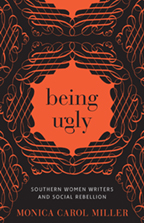
176 pages / no illustrations
Literary Criticism / American | Social Studies / Gender Studies | Women's Studies
Monica Carol Miller, assistant professor of English at Middle Georgia State University, is the author of Being Ugly: Southern Women Writers and Social Rebellion.
“Presumably like many scholars of women’s, American literary, and Southern studies, I have been expectantly awaiting something like Miller’s Being Ugly for some time. It provides a more than welcome and overdue intervention into the expressive operations of female corporeality, an area in which the now exhausted category of the grotesque has to date dominated. I now look forward to the way in which Miller’s study reorients how we read women’s writing and its tropes more broadly.”—Sarah Gleeson-White, editor of William Faulkner at Twentieth Century-Fox
“In Being Ugly, Monica Carol Miller proves it’s good to be bad. And in southern literature, one of the worst things a woman can do is look bad. The greatest sin: she makes the choice to ruin her beauty. Pretty, well-mannered ladies aren’t supposed to rebel, but when they do the plot moves, they change their lives, and become some of our favorite characters.”—Helen Ellis, author of Eating the Cheshire Cat and American Housewife
“Grounded in—and contributing to—a rich vein of recent feminist scholarship about southern women writers, Monica Miller’s new study provides a fresh angle on the ways that southern women writers have challenged and resisted a regional and literary culture that has insisted on either objectifying or marginalizing them. Being Ugly is a sassy retort to the idealized pedestal that southern women have so often been required to occupy. Supported by clear theoretical frameworks, Miller offers insightful re-readings of several canonical and recent texts, and her innovative perspective reveals how ‘being ugly’ can transform our understanding of how these southern women writers reconfigure the meanings of regionalism, of southern studies, and, indeed, the whole of American literature.”—Barbara C. Ewell, author of Kate Chopin and coeditor, with Pamela Menke, of Southern Local Color: Stories of Region, Race, and Gender
Found an Error? Tell us about it.